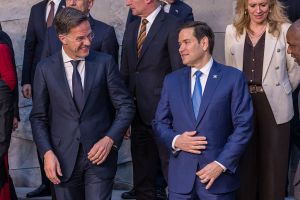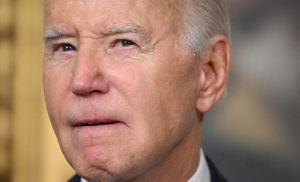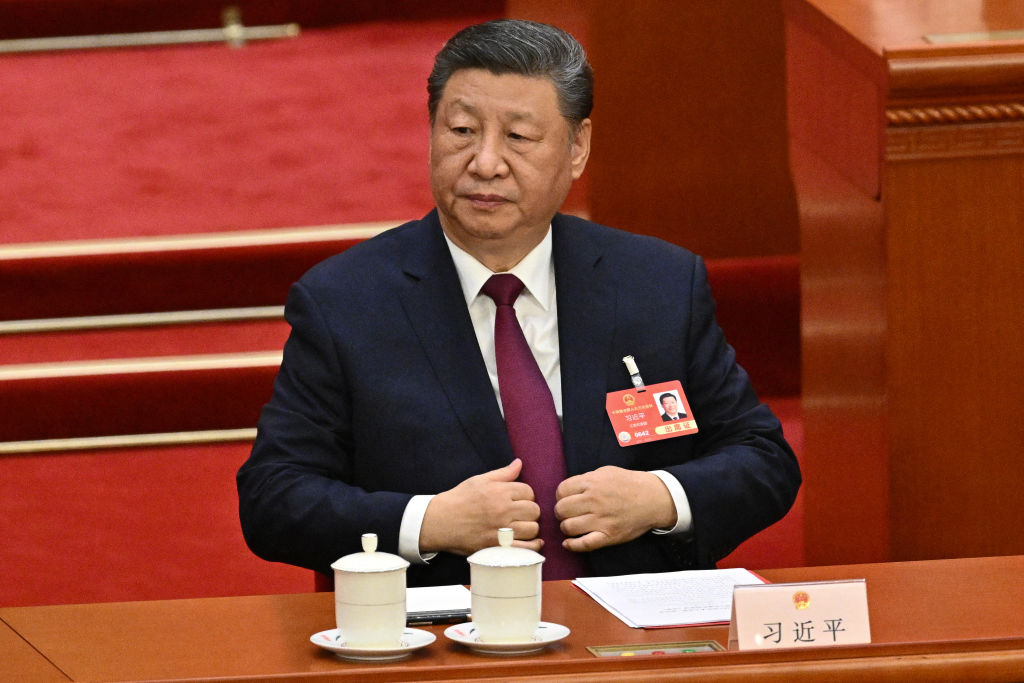America is retreating from the world stage. The country’s senile president appears absent from the dramatic events unfolding in the Middle East. Joe Biden urged Israel not to go into Rafah; to abstain from taking on Hezbollah; and to forgo retaliatory strikes against Iran. At every stage, the Israeli government followed its own counsel and is now reportedly ignoring his administration ahead of next month’s election.
Biden’s term in office has been marked by similar haplessness elsewhere in the region. He will be remembered above all for America’s ignoble and chaotic retreat from Afghanistan, which left local contractors and translators in the lurch and allowed the Taliban to reimpose their theocracy. When the US diplomat Richard Holbrooke insisted America had a responsibility to its local allies, Biden responded: “Fuck that, we don’t have to worry about that.”
Biden’s support for Ukraine initially looked like a foreign policy success. But as the war drags on, and the administration remains reluctant to allow Ukraine to use their weapons for strikes inside Russia, even that success threatens to turn into failure.
The man waiting in the wings is even more outspoken about reducing America’s engagement with the world. Donald Trump, who according to election forecasts and betting markets has roughly even odds of retaking the White House, remains deeply hostile to America’s traditional alliances, including NATO. His vision of international relations is transactional and zero-sum, which raises the prospect of an America that makes alliances conditional on gaining an immediate pay-off. As Trump said in February, he would encourage Russia to do “whatever the hell they want” to any NATO member that, in his estimation, doesn’t pay enough.
Compared to 2016, when Trump was big on bluster but short on executive experience or loyal staffers, he is today more determined and capable of putting that vision into practice. During his first term, Trump filled key positions in his administration with establishment figures who saw themselves as the “adults in the room” and he lacked full control over his own party’s congressional delegation. If he wins next month, he’s almost certain to pack his administration with loyalists who will do his bidding. There will be no Jim Mattis, much less a Fiona Hill, with any influence in the White House.
The one exception to America’s disengagement from the world is a bipartisan consensus to get tough on China. Democrats and Republicans have both proven willing to challenge Beijing in ways that just so happen to promise domestic popularity. The case of tariffs is notable, for example. There is a real economic rationale for responding to China’s extensive subsidies to key industries and for pursuing an industrial policy of one’s own. But tariffs have significant domestic costs and risk igniting a global trade war. It’s hard not to suspect they have been adopted by both sides, in good part, because it allows politicians to promise a renaissance of manufacturing in the very states, like Michigan and Pennsylvania, that play such an outsized role in the electoral college.
It is far less clear that either party would be willing to embrace policies that are likely to prove unpopular. Would either Kamala Harris or Trump be willing to risk the lives of American soldiers to maintain American deterrence in the Taiwan Strait? (Trump previously remarked that protecting the island wasn’t even possible: “Taiwan is 9,500 miles away. It’s sixty-eight miles away from China.”) And failing boots on the ground, would either candidate be willing to impose sanctions that meaningfully hurt China’s economy if those same policies also lead to a serious economic shock back home?
The answer to both questions is likely no. Trump, for instance, has publicly lamented that “immensely wealthy” Taiwan took America’s chip business; echoing remarks he has frequently made about Europe, he called for the island to “pay for its own defense.”
This bipartisan retreat puts America in a strange position. It would be easy to believe that the will to play the world’s policeman has gone. In some quarters, the obituaries for what, until recently, was thought to be the world’s only remaining superpower are already being written. Historian Harold James dubbed the country “late Soviet America” in the dying days of Trump’s first presidency. Niall Ferguson, meanwhile, now concludes that, in what he considers the new cold war between America and China, it’s the former rather than the latter that resembles the Soviet Union.
After the fall of the Soviet Union, America became the world’s only remaining superpower. It took on the role of world policeman by default. But the post-1989 era of American predominance turned out to be shorter than anyone expected.
America hurt its international standing, eroded domestic support for its foreign policy and expended over $5 trillion for a necessary war it humiliatingly lost (Afghanistan) and an unnecessary war it barely won (Iraq). Dictatorships that, during the 1990s, were principally focused on their own survival, slowly regained the confidence to go on the offensive. And with China multiplying its GDP by more than thirtyfold over the course of three decades, America acquired a genuine geopolitical competitor. For the first time since its emergence as a world power, the US found itself challenged by an adversary which rivalled it on a demographic, economic and military level. The rise of other traditionally non-aligned countries, from Brazil to India, further eroded America’s predominance.
But while these developments have constrained America’s capacity to impose its will on other countries, the extent of America’s decline is now often overstated. It is, for example, notable that since the heyday of its global dominance in the mid-1990s, the country’s share of global GDP has declined by less than a quarter, falling from about 20 percent in the mid-1990s to about 16 percent today.
Nor is it obvious that China will take America’s place as global hegemon anytime soon. The country’s expanding military might is untested. Beijing struggles to attract major allies and has tense or outright hostile relationships with most of its neighbors, including India. The country’s current economic crisis may prove temporary but it’s denting Beijing self-confidence and constraining its budgets.
Nor is it obvious that China will take America’s place as global hegemon anytime soon
Even China’s soft power is remarkably limited, with international perceptions of the country now remarkably negative, and its cultural influence far smaller than that of comparatively tiny neighbors like Japan or South Korea. (How many readers can name a single Chinese artist other than Ai Weiwei, or an actor besides Jackie Chan?)
Demographic trends also favor America. China has a population of 1.4 billion and the US of 333 million. But demographic projections suggest that the size of the two countries will converge rapidly. According to the United Nations, China will shrink to a population of around 800 million people by century’s end; the US will grow to a population of about 400 million. In other words, the ratio of the two country’s populations will fall from 4:1 to 2:1, a much smaller discrepancy. (Other competitors to the US, including Russia and even Iran, are also projected to experience a steep population decline in the coming decades.)
Perhaps, then, America’s unhappiness with its geopolitical role is not because of its diminished standing in the world — but rather to the fact that its size and economic might continue to make it a preeminent player on the world stage, whether its citizens want that role or not.
This is given further credence if you compare the US to its allies rather than its adversaries. Because of changes that have been a long time in the making, America makes up an ever greater share of the Western alliance. The demographic divergence is especially striking. Two centuries ago, America’s share of the population of developed countries was merely 6 percent. Since then, it has grown to 34 percent. By 2050, it is projected to reach 43 percent.
Economic trends are also conspiring to give America an ever more dominant role within the transatlantic alliance. In the 1980s, America and Europe had roughly the same GDP; even though the US already spent more lavishly on the military at the time, this should have allowed both sides of the Atlantic to make a roughly equal contribution to their joint defense. Since then, the economic performance of Europe and America has diverged sharply; by sometime in the 2040s, the US is projected to command double Europe’s GDP. Even if Trump or Harris somehow persuaded countries like Germany to spend as high a percentage of their national GDP on the military as America does, NATO’s European members could never match America’s contribution.
Since the end of World War Two, the relationship between Europe and America has been uneven, leading to tensions that would erupt eventually. Europeans, meanwhile, have long felt resentful about the political, military and even cultural dominance of the US. America has long felt that its European allies weren’t pulling their fair share of the weight. For structural reasons, both of these resentments are likely to grow in decades to come.
Most Americans have grown impatient with the obligations that their country’s status as a major superpower imposes on their country. They care more about prosperity at home than maintaining stability abroad; in a spring 2023 poll from Pew, for example, 55 percent said that “we should pay less attention to problems in other countries and concentrate on America’s problems.” They are particularly frustrated with America’s resort to military force, having grown increasingly reluctant to spend even more American blood or treasure on foreign policy adventures like the war in Iraq.
But while Americans are becoming less willing to bear the price for being a global hegemon, they expect their politicians to maintain their country’s global pre-eminence. In another recent Pew poll, only one in three Americans said that it would be acceptable “if another country became as militarily powerful as the United States.” And while over half of respondents said that it is very or extremely important for America to “play an active role in world affairs,” only one in ten believed that this was “not too” or “not at all” important.
If America has at times acted erratically or inconsistently on the world stage, it is not only because the leaders of the Democratic and Republican parties now disagree about major questions of foreign policy to a much larger extent than in the past; it is also because both Democratic and Republican voters would love to square the circle, reaping the benefits of America’s global role without paying the requisite price.
America, it seems, is destined to become a resentful hegemon
Trump has a preternatural talent for sniffing out areas in which the political establishment has come to leave the mainstream behind. He was undoubtedly right in recognizing that support for making the sacrifices that would sustain America’s leading role in the world has fallen considerably over the last decades. But, ironically, Trump may now be underestimating the patriotism of his compatriots, including the fact that they would likely turn on any politician who is perceived as allowing other countries to rival America’s power.
Biden, despite or perhaps because of the contradictions at the heart of his foreign policy, may on that count be a more faithful representation of the state of American public opinion. To him, it is inconceivable to abandon the transatlantic relationship, to torpedo NATO, or to forgo America’s leading role in the world. And yet, he has proven far less willing than most previous presidents to take the action and pay the price that the maintenance of this international pre-eminence would require. Though Biden increasingly looks like a man of the past, the contradictions at the heart of his foreign policy may thus turn out to be a harbinger of the future.
America, it seems, is destined to become a resentful hegemon. The country’s current voters no longer care for the role that its past leaders took on. But even though they feel that the price has become too steep, they expect to continue reaping the benefits which have traditionally stemmed from playing that role. The country is doomed if it does and doomed if it doesn’t — and so, it seems, are those who live in countries which have traditionally relied on the US being a reliable partner.
This article was originally published on The Spectator’s UK website.

























